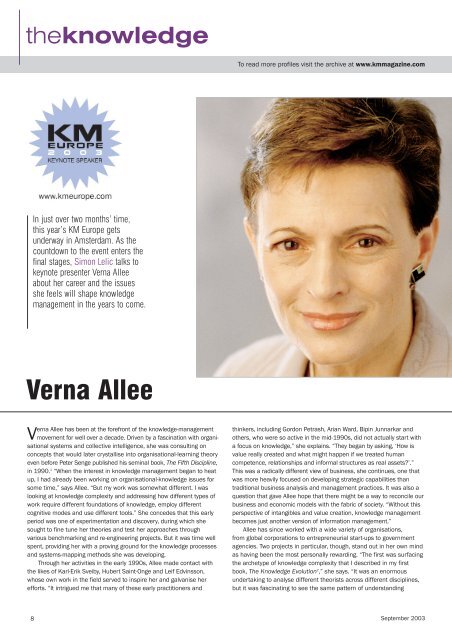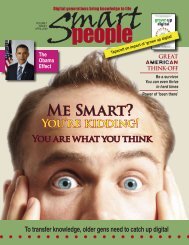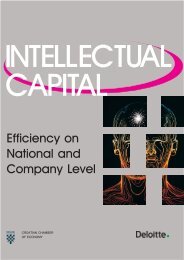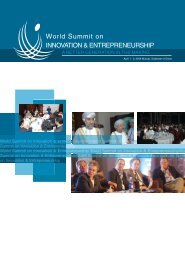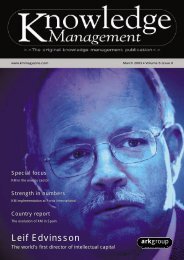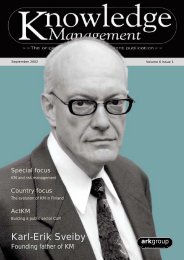Verna Allee
read more
read more
- No tags were found...
You also want an ePaper? Increase the reach of your titles
YUMPU automatically turns print PDFs into web optimized ePapers that Google loves.
theknowledgeTo read more profiles visit the archive at www.kmmagazine.comIn just over two months’ time,this year’s KM Europe getsunderway in Amsterdam. As thecountdown to the event enters thefinal stages, Simon Lelic talks tokeynote presenter <strong>Verna</strong> <strong>Allee</strong>about her career and the issuesshe feels will shape knowledgemanagement in the years to come.<strong>Verna</strong> <strong>Allee</strong><strong>Verna</strong> <strong>Allee</strong> has been at the forefront of the knowledge-managementmovement for well over a decade. Driven by a fascination with organisationalsystems and collective intelligence, she was consulting onconcepts that would later crystallise into organisational-learning theoryeven before Peter Senge published his seminal book, The Fifth Discipline,in 1990. 1 “When the interest in knowledge management began to heatup, I had already been working on organisational-knowledge issues forsome time,” says <strong>Allee</strong>. “But my work was somewhat different. I waslooking at knowledge complexity and addressing how different types ofwork require different foundations of knowledge, employ differentcognitive modes and use different tools.” She concedes that this earlyperiod was one of experimentation and discovery, during which shesought to fine tune her theories and test her approaches throughvarious benchmarking and re-engineering projects. But it was time wellspent, providing her with a proving ground for the knowledge processesand systems-mapping methods she was developing.Through her activities in the early 1990s, <strong>Allee</strong> made contact withthe likes of Karl-Erik Sveiby, Hubert Saint-Onge and Leif Edvinsson,whose own work in the field served to inspire her and galvanise herefforts. “It intrigued me that many of these early practitioners andthinkers, including Gordon Petrash, Arian Ward, Bipin Junnarkar andothers, who were so active in the mid-1990s, did not actually start witha focus on knowledge,” she explains. “They began by asking, ‘How isvalue really created and what might happen if we treated humancompetence, relationships and informal structures as real assets?’.”This was a radically different view of business, she continues, one thatwas more heavily focused on developing strategic capabilities thantraditional business analysis and management practices. It was also aquestion that gave <strong>Allee</strong> hope that there might be a way to reconcile ourbusiness and economic models with the fabric of society. “Without thisperspective of intangibles and value creation, knowledge managementbecomes just another version of information management.”<strong>Allee</strong> has since worked with a wide variety of organisations,from global corporations to entrepreneurial start-ups to governmentagencies. Two projects in particular, though, stand out in her own mindas having been the most personally rewarding. “The first was surfacingthe archetype of knowledge complexity that I described in my firstbook, The Knowledge Evolution 2 ,” she says. “It was an enormousundertaking to analyse different theorists across different disciplines,but it was fascinating to see the same pattern of understanding8September 2003
playing out in so many different fields.” The second centred on herwork developing the ‘HoloMapping’ methodology she describes in herlatest book, The Future of Knowledge. 3 HoloMapping is essentially ameans of mapping the role of knowledge and intangibles in valuecreation. “It has been especially satisfying that the same simpleapproach works well for analysing everyday work processes aswell as complex strategic relationships and value networks,” says<strong>Allee</strong>. “It also gives people a way to link everyday work activitiesto both financial and non-financial scorecards. I believe our mostimportant challenge is to take our new understanding aboutknowledge, intangibles and systems thinking into the nextgeneration of management tools.”Much of <strong>Allee</strong>’s current work involves helping clients of <strong>Verna</strong><strong>Allee</strong> Associates, of which she is president and founder, get off toa good start with their KM project, or overhauling an initiative thatisn’t delivering on its potential. In her own words, she helpspeople to devise knowledge strategies, develop indicators andscorecards for tracking progress, and install tools and supportsystems for communities of practice and value-network analysis.But despite the centrality of KM-based principles in her work,<strong>Allee</strong> regards herself as a business consultant rather than anadviser on knowledge management per se. “My first concern isthe health and vitality of organisational systems,” she explains.The consulting projects with which <strong>Allee</strong> is involved also serve toground the extensive research and writing she undertakes. This,she says, is her real passion. “I am always asking, what is ahead?What is the larger pattern that is emerging, and what do we needto be able to understand and work with in the next few years?”As part of her search for answers, <strong>Allee</strong> is focused ondeveloping a deeper understanding of how what we have learntso far about knowledge and intangibles can be applied at asocietal level to address complex global issues. It is a topicshe and her colleagues are approaching from several differentangles. The first is by learning more about how global actionnetworks can be more effective. “In addition, we are trying tounderstand what really happens when larger value networksevolve as small NGOs and other associations begin to find eachother and link up,” she continues. “The way knowledge andintangibles are leveraged across these networks has a lot to dowith how effective they are.” <strong>Allee</strong> has also been advising theEuropean Commission on a project called ‘New partnerships forsustainable development in the knowledge economy’, which seeks todevelop a vision of 360-degree accountability, transparency and participationaround indicators for sustainable development that will enabletangible change at a city and regional level. “We are taking KM, intangiblesand communities of practice to the societal level,” she enthuses.It is an ambitious project, and one that hopes to take knowledgemanagementthinking a real step forwards. Indeed, since her owncareer in the field began, <strong>Allee</strong> has been conscious that knowledgemanagement is continuously evolving. “Knowledge management isdeveloping in very much the same way that companies evolve once theybegin to address the knowledge issue,” she says. “The first stages arefocused on laying down a technology platform where people can talk witheach other and exchange data across different systems. Early wins are atthe operational level, in ensuring that people have access to the informationthey need to get their work done. The second level kicks in a bitlater. This is a more tactical focus on the human aspects of knowledgesharing, with an emphasis on communities, social-network analysis,knowledge sharing and collaborative processes.” In <strong>Allee</strong>’s mind, mostorganisations continue to concern themselves with these two aspects ofknowledge management. The next step, she says, is to take a deeperlook at the business or strategic issues that grapple with how knowledgeand intangibles can be leveraged in the business model.“The greatest struggle is rethinking the business and getting awayfrom mechanistic thinking to the perspective of the enterprise as aliving network,” <strong>Allee</strong> says. This, she feels, is an issue that has yet toattract the attention it deserves. “We are pitifully poor at conceptualthinking in business, especially in the US. When I ask people todescribe to me their business model, they often ask me want I amtalking about, and find it impossible to articulate a clear picture of howtheir business works.” <strong>Allee</strong> believes current thinking is caught verymuch in a linear, mechanistic vein – people simply do not know how todescribe their business as a value network or a dynamic system. Whilepractitioners have paid a lot of lip service to the concept of businessesas networks and industrial clusters, the process of incorporating theseideas into management tools is only just beginning.It is a situation that <strong>Allee</strong> feels must change. “It is vital that we let goof our old ideas about organisational and corporate structures and beginto see the world of enterprise as it really works.” This, she says, meanstaking knowledge and intangibles more seriously than is the currentnorm, not just at the business level but at the micro level of teams andworkgroups and the macro level of economic policy and theory. “Toomuch of what we hear about the knowledge economy is old wine pouredinto new bottles,” she adds. “The words are different, but the approaches,tools and methods are strictly industrial age.” <strong>Allee</strong> maintains there is alsoa growing moral imperative around social and environmental responsibilitythat is impacting upon the way businesses make decisions and howgovernments make and implement policy. We are, she says, moving intoa world where every organisation will be held accountable for acting asa good global citizen. “This is the inevitable outcome of the knowledgeera. The capacity to work consciously with the business model andreconfigure relationships through leveraging knowledge and intangiblesis not an abstract exercise – it is an essential survival skill.”It is a powerful call to action, one that <strong>Allee</strong> will be reiterating at thisyear’s KM Europe. “During my keynote address I will share some of mythinking around how the field is developing, and where it will go in thefuture,” she says. “I will try to provide a glimpse into how the failure ofcorporations and nation states to deal with global issues is opening up apathway for a new system of governance. Value networks that skilfullyleverage knowledge and intangibles are beginning not only to dominatethe world of business, but also to become a real force of change acrossthe globe. This offers those of us with a passion for knowledge a realopportunity to make a difference in the world.” <strong>Allee</strong> will also be runninga masterclass at KM Europe 2003, during which she will go into greaterdepth about her unique methods and approaches to knowledgemanagement. Participants will have the chance to experience how <strong>Allee</strong>’svalue-network approach can be applied in real-world situations; as shesays, it will be a very hands-on session focused on building tangible skills.<strong>Allee</strong> will be presenting alongside the likes of Dorothy Leonard,Ciaran McGinley, Carla O’Dell, Dave Snowden and Fons Trompenaars,and has high expectations of the event. “The combined conferenceand exhibition format is the only way to go,” she says. For <strong>Allee</strong>,though, the most exciting prospect is having such a large proportion ofthe knowledge-management community gathered in a single place.“The real action is always in the hallways and the in-between places,”she says. “Wandering the exhibits is a great way to encourage thenetworking and conversations that build community.” Above all, ofcourse, KM Europe will be a learning experience – a chance to benefitfrom the knowledge accumulated by some of the world’s foremost KMpractitioners and to strengthen the networks that will foster the futuredevelopment of the discipline. Even for someone with <strong>Allee</strong>’s level ofexpertise and experience, it will be an unmissable occasion. •References1. Senge, P, The Fifth Discipline: The Art and Practice of the Learning Organization(Random House, 1990)2. <strong>Allee</strong>, V., The Knowledge Evolution: Expanding Organizational Intelligence(Butterworth-Heinemann, 1997)3. <strong>Allee</strong>, V., The Future of Knowledge: Increasing Prosperity through Value Networks(Butterworth-Heinemann, 2003)September 2003 9


